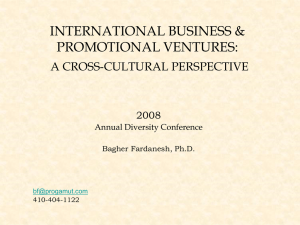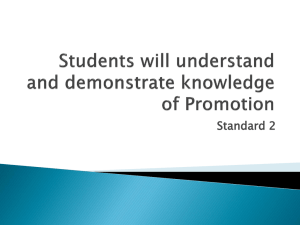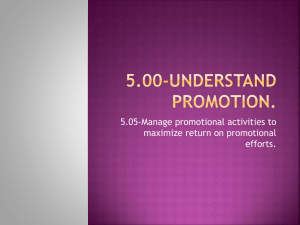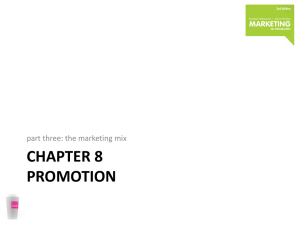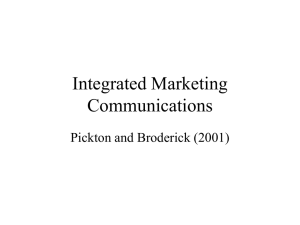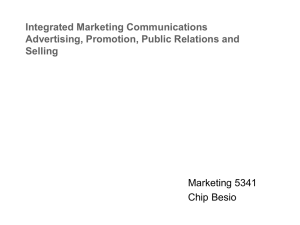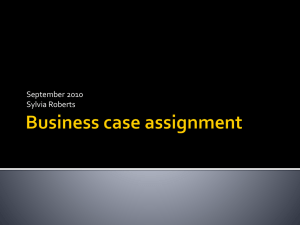promotional mix
advertisement
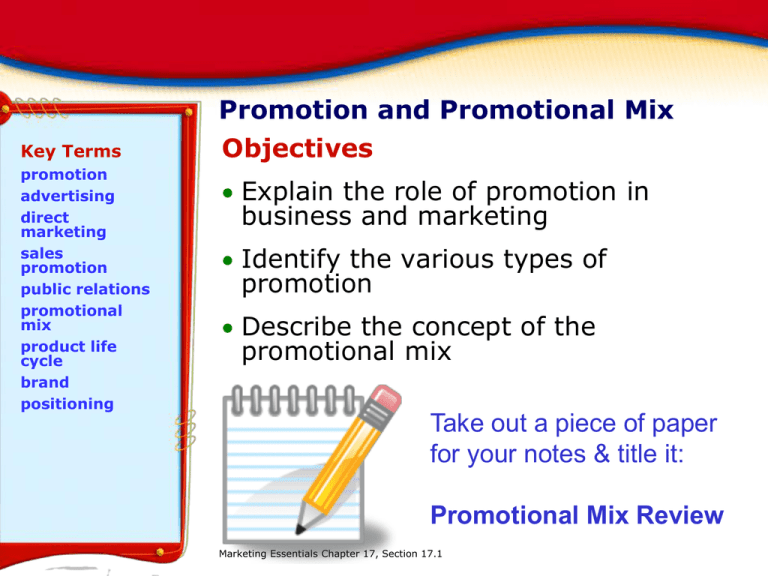
Promotion and Promotional Mix Key Terms promotion advertising direct marketing sales promotion public relations promotional mix product life cycle brand positioning Objectives Explain the role of promotion in business and marketing Identify the various types of promotion Describe the concept of the promotional mix Take out a piece of paper for your notes & title it: Promotional Mix Review Marketing Essentials Chapter 17, Section 17.1 REVIEW A marketing mix is the elements of marketing that can be used by a company to influence consumers to purchase goods or services. ? Price ? Product ? Place ? Promotion Promotional Mix A promotional mix is the combination of different promotional elements that a company uses to reach and influence potential customers. The marketing mix is often referred to as the 4 P’s These are the tools or basic strategies that marketers use to influence potential customers. There are five basic categories in the promotional mix: Public Relations Personal Selling Advertising Promotional Mix Direct Marketing Marketing Essentials Chapter 17, Section 17.2 Sales Promotion Types of Promotion in the Promotional Mix Personal selling involves direct contact between salespeople and customers. This can take place in the forms of: • Personal meetings • Telemarketing Marketing Essentials Chapter 17, Section 17.1 advertising A form of nonpersonal promotion in which companies pay to promote ideas, goods, or services in a variety of media outlets. Types of Promotion in the Promotional Mix Advertising is a form of non-personal promotion and one-way communication. It can be found in places including: • Newspapers • Magazines • Television • Web sites • Billboards • City buses Marketing Essentials Chapter 17, Section 17.1 direct marketing A type of advertising directed to a targeted group of prospects and customers rather than to a mass audience. Types of Promotion in the Promotional Mix Direct marketing is a type of advertising directed to a targeted group of prospects rather than to a mass audience. Three forms are: • Printed direct mail • Electronic direct mail • Social Media The goals of direct marketing are to generate sales and leads for salespeople to pursue. Marketing Essentials Chapter 17, Section 17.1 public relations (PR) Activities that help an organization influence a target audience. publicity A tactic that public relations professionals use to bring information about an organization to the public’s attention. Types of Promotion in the Promotional Mix Public relations (PR) activities try to create a favorable image for a company, its products, or its policies. Publicity involves bringing news or newsworthy information about an organization to the public’s attention. Publicity’s risk is that its content is not easily controlled by the business that issues it. Marketing Essentials Chapter 17, Section 17.1 Types of Promotion in the Promotional Mix sales promotion All marketing activities–other than personal selling, advertising, and public relations– that are used to stimulate purchasing and sales. Sales promotion represents all marketing activities (other than personal selling, advertising, and public relations) that are used to stimulate purchasing and sales. There are two types: • Consumer sales promotion • Trade promotion Marketing Essentials Chapter 17, Section 17.1 Consumer Promotions consumer promotions Sales strategies that encourage customers and prospects to buy a product or service. Consumer promotions are sales strategies that encourage customers and prospects to buy a product or service. Trade promotions are sales promotion activities designed to get support for a product from: • Manufacturers • Wholesalers • Retailers Marketing Essentials Chapter 17, Section 17.2 The Concept of Promotional Mix promotional mix A combination of strategies and a cost effective allocation of resources. A promotional mix X is a combination of strategies and a cost-effective allocation of resources a company uses to reach its promotional goals. The strategies in the mix are designed to complement one another: • Advertising and direct marketing create public awareness. • Public relations helps cultivate a favorable image and brand recognition. • Sales promotional activities stimulate sales and reinforce advertising. • Personal selling builds on all of these efforts by completing the sale. Marketing Essentials Chapter 17, Section 17.1 Let’s look at a real example! Gatorade introduced in 1965 In early summer of 1965, a University of Florida assistant coach sat down with a team of university physicians and asked them to determine why so many of his players were being affected by heat and heat related illnesses. What comes to mind when you think of Gatorade? In the summer of 1969, Gatorade became the official sports drink of the NFL—a title it holds to this day. What is brand identity? Definition: How you want the consumer to perceive your product or your brand. What is positioning? Definition: Positioning has come to mean the process by which marketers try to create an image or identity in the minds of their target market for its product, brand, or organization Product Positioning The focus of positioning is the image a product projects. The goal of product positioning is to set the product apart from the competition. Products can be positioned: by price and quality by features and benefits in relation to the competition in relation to other products in a line Product Positioning Positioning by Price and Quality • Stresses paying more as a symbol of quality or low price as an indication of value. Positioning by Features and Benefits • Stresses product features and benefits, or unique characteristics. Marketed as a platform for audio and visual media such as books, periodicals, movies, music, and games, as well as web content Product Positioning Positioning in Relation to the Competition Stresses comparison to the competition or play to the competitor's weaknesses. Positioning in Relation to Other Products in a Line Stresses association with a successful brand. Slide 3 of 3 What positioning strategy did Gatorade use? Positioning by Features & Benefits Gatorade No. 1 Sports Beverage Worldwide Marketing Essentials Chapter 17, Section 17.1 CASE STUDY You have been hired to create a promotional campaign for a “mystery” product. Tell us who your target audience is, what image you would like to create for the product (positioning strategy), and what promotional mix you have for the campaign. Provide rationale for your choices. Hint: Create your concept 1st so you have a central theme
